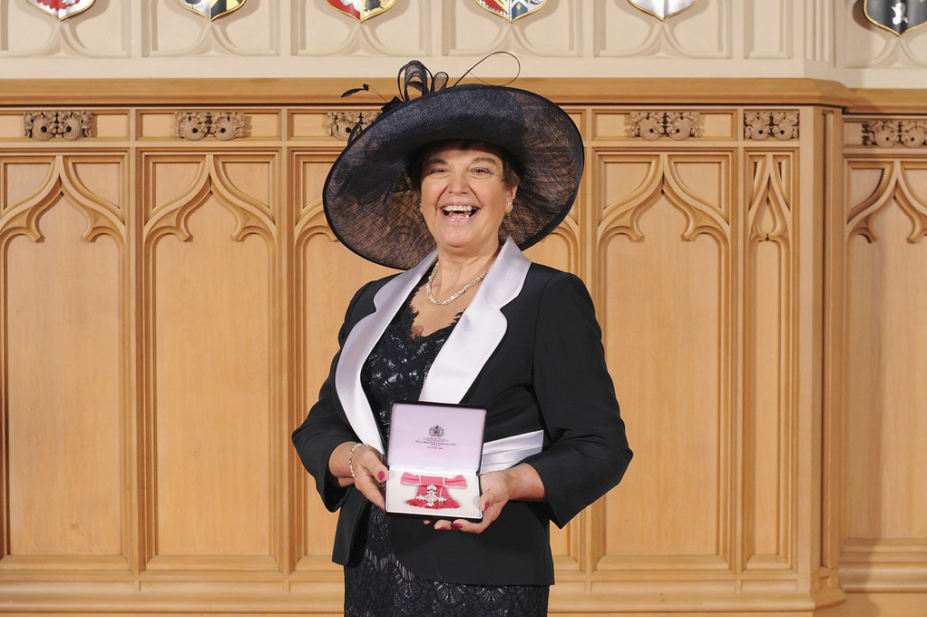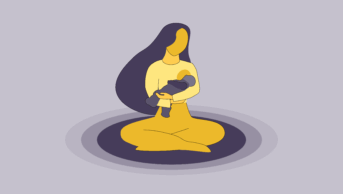
Wendy Jones
Wendy Jones’s Drugs in Breastmilk service, which operates through the Breastfeeding Network charity, supports breastfeeding women who have concerns about taking medicines. Jones has written three books: Breastfeeding and Medication; The Importance of Dads and Grandmas to the Breastfeeding Mother, and Why Mothers’ Medication Matters.
On 22 March 2019, she was awarded an MBE for services to mothers and babies and, in 2018, she received a Point of Light award from Prime Minister Theresa May in recognition of her work in medicines safety.
Congratulations on receiving an MBE. Were you expecting it?
Not at all — when the letter came through, my husband said: “It’s from the cabinet office,” and I said: “What, IKEA?”.
Through the Drugs in Breastmilk service, I answer questions about medicines in breastmilk from mothers who are breastfeeding, or who are pregnant, as well as from healthcare professionals
What does your work entail?
Through the Drugs in Breastmilk service, I answer questions about medicines in breastmilk from mothers who are breastfeeding, or who are pregnant, as well as from healthcare professionals. The role I do is very similar to the UK Drugs in Lactation Advisory Service, but questions to me predominantly come via social media, which is where we find most mums are these days. We used to have a telephone service but there was only me to answer the phone calls, and I was never around to answer them in real time.
People can ask whatever they want — anything from: “Can I have my nails painted?” to: “I went out last night, and I was really stupid, and I did two lines of cocaine: can I breastfeed?” It’s a huge, wide range of queries.
Do you respond to the questions publicly?
No: they are all sent as private messages so only myself and Amanda da Costa, another pharmacist in the Breastfeeding Network, and a small team of administrators can see them. There is no breach of confidentiality, so people can ask anything that they want to.
What got you into this line of pharmacy?
I was a community pharmacist. I was originally born over a Boots store in South Wales so there was never anything else that I was going to do other than be a community pharmacist.
When I had my second daughter, a health visitor said to me: “You’re really good at breastfeeding: would you come and show the next group how easy it is?”
Then, in 1995, I joined one of the breastfeeding voluntary organisations, and somebody said: “You’re a pharmacist: we need some breastfeeding counsellors. Would you like to train, and then we can put the two roles together and you can update this two-page A4 sheet that we’ve got about drugs in breastmilk?” I put my home telephone number on the factsheet so that anyone who had a problem could call me.
I didn’t think I would receive many calls, but it got busier and busier and when the breastfeeding network was formed in 1997, they set up a dedicated telephone line into my house.
Information about medicines while breastfeeding is not something we teach well enough at undergraduate level
Since then, the service has just grown and grown. In 2011, I decided to leave my job as a community pharmacist and work on breastfeeding websites, information sheets, training and writing the book that I’d been wanting to write for a long time, Breastfeeding and Medication. I did a PhD at Portsmouth University as well, entitled: ‘Community pharmacists support for breastfeeding mothers requiring medication during lactation.’
All the strands came together: I just followed the opportunities.
It often feels like pregnant and nursing women get conflicting information about what they should and shouldn’t do: does that apply to medicines advice as well?
Definitely. And it’s very difficult because most medicine use in pregnancy and lactation is outside of licensed applications. So you need to be able to go to specialist sources of information: The British National Formulary can only be a general guide. And information about medicines while breastfeeding is not something we teach well enough at undergraduate level at the moment. This is becoming more and more important as more women breastfeed.
We know that breastfeeding itself affects the way that women think about medicines. A lot of women will put up with all kinds of symptoms rather than taking medicine, because they want to protect their baby above everything else: this is their gold standard. They will go without antidepressants, or won’t go and see a doctor because they’re frightened that someone will tell them that they need to stop breastfeeding.
What kind of things have women who have approached you been worried about?
About 20% of the messages I receive are about mental health: depression and anxiety being chief among those.
What kind of feedback have you had from users of the service?
We’ve just finished an evaluation of the service, and the thing that came out most strongly was that people feel reassured after talking to us. They want to speak to someone and they want to see all the information. When the MBE was announced, people were messaging me saying: “Without your input I would have stopped breastfeeding when my baby was eight weeks: I’m still feeding at 16 months”; and “You’re a lifeline.”
Would it be helpful to other healthcare professions to have a pharmacist like you on hand to provide information about taking medicine while breastfeeding?
Healthcare professionals often come to me for advice. They often have the same problem as pharmacists: they haven’t had the undergraduate knowledge. That’s what my PhD showed: the influence of pharmacists was largely based on their personal experience. If a pharmacist had breastfed and they were passionate about it, they would go and find an answer. If they had not succeeded in breastfeeding, they tended to be more negative.
We know that if slightly more women breastfed, we would save £40m a year — it would make a massive difference
Often, pharmacists don’t find specialist sources and they don’t have time to. Whether it’s in a busy community pharmacy or a busy GP surgery, you haven’t got time to go and look at the specialist information and understand it.
That’s why, on the website, there are lots of factsheets written in a way that has enough information for a prescriber to be happy, and enough information written in a way that any woman can understand it.
What advice do you have for pharmacists speaking to pregnant or breastfeeding women with questions about medicines?
Look at specialist sources. We can’t rely on the information leaflets in the medicine pack because they will invariably say: “Don’t use this if you’re pregnant or breastfeeding.” Our website has lots of factsheets on headlice, ingrowing toenails, painkillers and more — use those. There are free resources on the internet as well. There’s a database called LactMed, which women can search and find all the information.
But it’s about valuing breastfeeding as a health priority in the UK. We know that if slightly more women breastfed, we would save £40m a year — it would make a massive difference.
What would help you do your job?
If we could get information about medicines and breastfeeding onto the undergraduate programme for all healthcare professionals.
On a Sunday morning, women need to have the answer as to what painkillers they can have. They need to know, on a Friday night, when their five-year-olds come home from school with a letter that says they’ve got headlice or threadworms, can the mother take the recommended medicines?
It can’t ever be a 9:00 to 17:00 job. So often, I’m finding that women are told: “Well, it doesn’t matter — you can stop breastfeeding for three days,” but they are not told how to maintain their lactation. They don’t know how to ‘pump and dump’ so that they don’t develope mastitis. It’s as if everyone assumes that breastfeeding is a tap that you turn on and off, or that every baby will have a bottle.
Even if someone is depressed, breastfeeding may seem like the only thing she is finding positive in her life. She’s watching her baby grow and develop, and that’s positive. If then you say: “I want you to stop breastfeeding to take the medication” — you’re taking away the part of life that is good for her.


